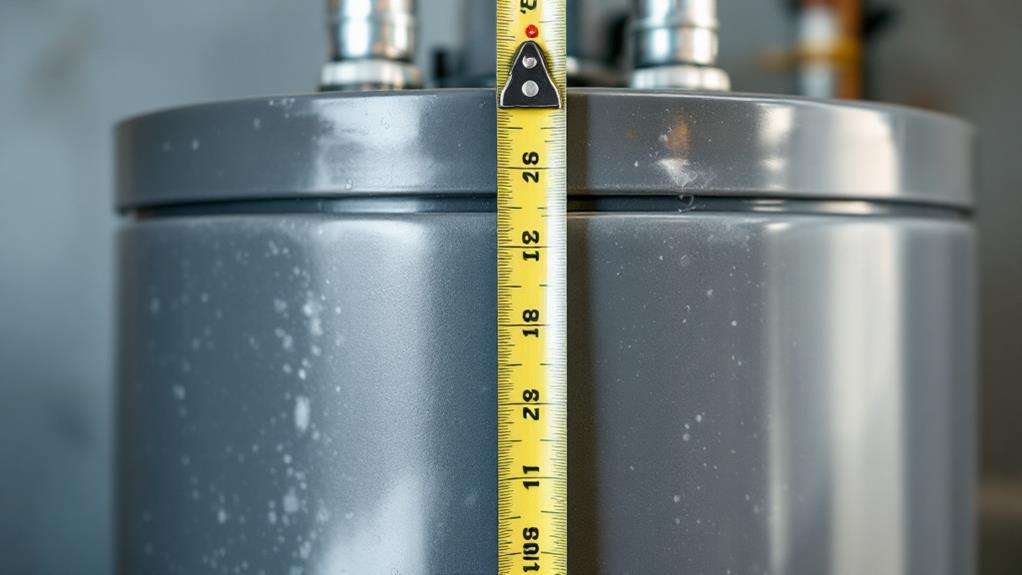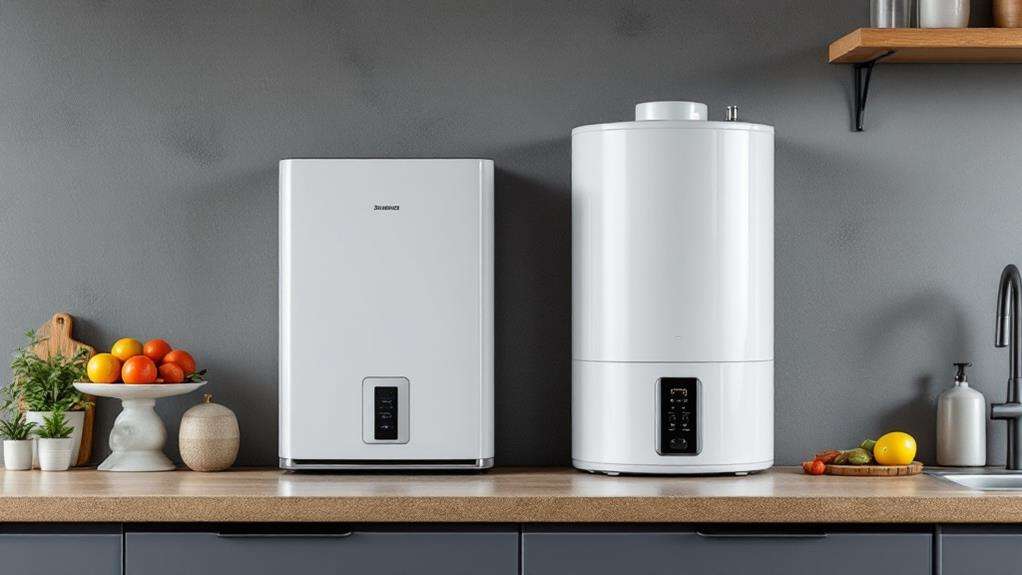How to Choose the Best Water Heater for a Large Family
To choose the best water heater for your large family, start by assessing your household's hot water needs. Consider your family size, usage patterns, and peak demands to select the right tank capacity. Evaluate energy efficiency, comparing electric and gas models, and weigh upfront costs against long-term savings. Ensure proper ventilation and compliance with local codes during installation. Decide whether a tankless or traditional water heater better suits your needs, factoring in capacity, recovery rate, and maintenance. With these considerations in mind, you'll be well on your way to finding the perfect water heater solution.
Key Takeaways
- Assess the family's hot water needs based on household size, usage patterns, and anticipated changes to determine the appropriate tank capacity.
- Evaluate energy efficiency considerations, such as utility rebates, Energy Factor (EF) or Uniform Energy Factor (UEF) ratings, and the benefits of tankless water heaters.
- Ensure the selected water heater can accommodate simultaneous water usage and maintain an adequate recovery rate to meet the family's hot water demands.
- Consider the installation requirements, including the existing plumbing setup, ventilation for gas-powered models, and compliance with local building and safety codes.
- Compare the features and costs of tankless and traditional water heater options to determine the best fit for the family's needs and budget.
Assess Your Family's Hot Water Needs
When choosing a water heater for a large family, it's crucial to accurately assess your household's hot water needs. Consider your family size - the more people living under your roof, the greater your demand for hot water. Examine your current usage patterns, too. How many showers, baths, and loads of laundry happen daily? Do you have water-intensive appliances like a dishwasher or a washing machine? Knowing your peak hot water needs will help you select the right size of water heater.
Don't forget to factor in future growth. If you're planning to expand your family, choose a heater that can accommodate those additional hot water requirements. Likewise, consider potential changes in your daily routine, such as older children taking longer showers. By carefully evaluating your household's present and anticipated hot water usage, you'll be able to pick the perfect water heater to meet your large family's needs.
Evaluate Energy Efficiency Considerations
Energy efficiency is another vital factor to consider when selecting a water heater for your large family. Evaluate utility rebates and incentives that can help offset the upfront cost of a more energy-efficient model. Assess energy efficiency ratings, such as the Energy Factor (EF) or Uniform Energy Factor (UEF), to determine how much energy the water heater will consume. Look for water heaters with higher efficiency ratings, as they'll save you money on your utility bills in the long run.
Additionally, consider the fuel type. Electric water heaters are generally more energy-efficient than gas models, but natural gas may be more cost-effective depending on your local utility rates. Tankless water heaters are also an energy-efficient option, as they only heat water on demand rather than continuously maintaining a tank's temperature. Ultimately, weigh the upfront costs and long-term energy savings to find the most efficient water heater that meets your large family's hot water needs.
Determine the Appropriate Tank Capacity

Determining the appropriate tank capacity is a key consideration when selecting a water heater for your large family. The size of the tank will determine how much hot water is available for your household's needs. To choose the right tank capacity, consider the following factors:
- Number of Household Members: As a general rule, you'll need a larger tank capacity for a larger family. A good estimate is 10-15 gallons per person.
- Simultaneous Water Usage: Monitor tank temperatures and regulate water flow to accommodate multiple hot water demands, such as showers, laundry, and dishwashing.
- Recovery Rate: Ensure the water heater can quickly reheat the tank's capacity to maintain a consistent supply of hot water.
- Energy Efficiency: Select an energy-efficient model to minimize utility costs and reduce your environmental impact.
Understand Installation Requirements
Installing a water heater for your large family involves more than just choosing the right tank capacity. You'll also need to consider the plumbing considerations and ventilation requirements to ensure a safe and efficient installation.
First, you'll need to assess your existing plumbing setup. This includes evaluating the diameter and material of your water supply lines, as well as the location of the water heater. Depending on the model you choose, you may need to make adjustments to your plumbing to accommodate the new unit.
Additionally, proper ventilation is crucial for the safe operation of your water heater. Gas-powered models require a dedicated vent or flue to remove exhaust gases, while electric units may have different requirements. Consult with a licensed plumber to ensure your home's ventilation system can handle the water heater you've selected.
Compare Tankless and Traditional Options

When selecting a water heater for your large family, you'll need to weigh the benefits and drawbacks of both tankless and traditional water heater options. Tankless water heaters offer on-demand hot water, improved energy efficiency, and a compact design, but they typically have higher upfront costs and may require upgrading your home's gas or electrical system. Traditional tank-style water heaters are often more affordable, but they have a limited hot water supply and can lose efficiency over time.
Consider these factors when comparing your options:
- Fuel source options: Tankless water heaters can run on electricity, natural gas, or propane, while traditional water heaters are typically powered by electricity or natural gas.
- Capacity and recovery rate: Tankless models provide an endless supply of hot water, while traditional tanks have a limited capacity that may not meet the demands of a large family.
- Maintenance requirements: Tankless heaters generally require less maintenance, but they do need periodic flushing to remove mineral buildup.
- Energy efficiency and cost savings: Tankless water heaters can be more energy-efficient, potentially leading to lower utility bills, but the initial investment may be higher.
